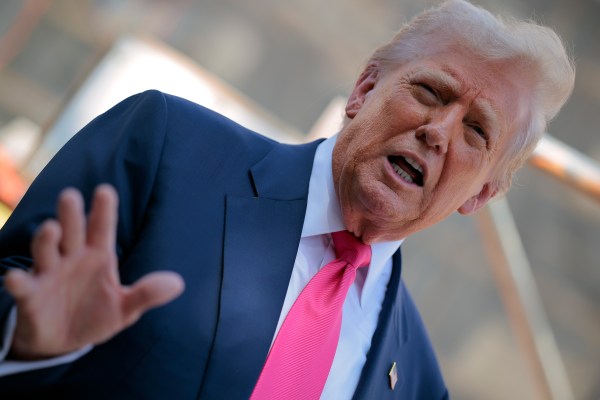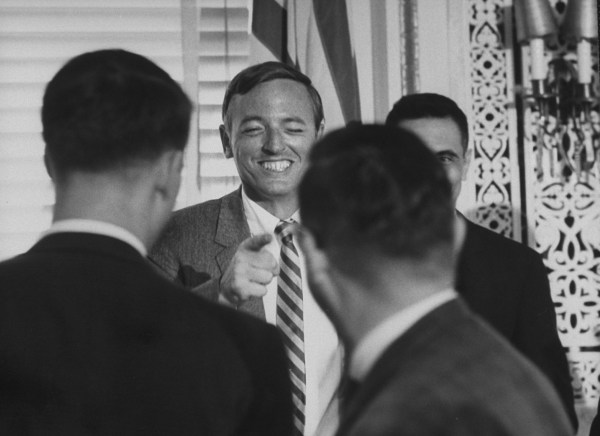Editor’s Note: We apologize for the delay in sending this newsletter. Nick filed on time; we’re experiencing technical difficulties with our email service provider that will be resolved shortly.
Officials in the Trump White House have sounded friendlier to Ukraine recently than the president ever did last year as a candidate. What gives?
Maybe it was that minerals deal they signed with Volodymyr Zelensky that changed their minds. Or maybe it was the heart-to-heart Zelensky had with Trump at Pope Francis’ funeral, the most miraculous diplomatic success in Italy since the first Pope Leo rode out to meet Attila.
Probably, though, it’s the fact that Russia keeps making the president look like a chump by ignoring his calls for a ceasefire. “Vladimir, STOP!” Trump demanded on April 24. Vladimir did not stop. A few days later the president wondered whether “maybe he [Putin] doesn’t want to stop the war, he’s just tapping me along” and threatened additional sanctions on Russia if the fighting continued. Nearly a month later, the fighting continues.
Even J.D. “I don’t really care what happens to Ukraine” Vance, fresh off his own Italian honeymoon with Zelensky, seemed to see the conflict with new clarity when he spoke to reporters last weekend. “I think honestly that President Putin, he doesn’t quite know how to get out of the war,” he observed, correctly. Of Trump’s forthcoming phone call with the Russian leader, Vance predicted that “the president’s going to say to President Putin, look, are you serious?”
Pretty good! But then Vance dropped this: “We should be able to move beyond the mistakes of the past, but that takes two to tango. … If Russia’s not willing to do that then we’re eventually just going to have to say, ‘This is not our war.’”
We’re threatening to withdraw from a conflict in which we’ve been supporting Russia’s enemy in the belief that doing so will … pressure Russia? That doesn’t sound very “art of the deal” to me.
But that’s where we might be headed. On Monday, following his phone call with Putin, Trump appeared to wash his hands of further U.S. involvement in the peace process—and, perhaps, the war—between Ukraine and Russia. A ceasefire can only be negotiated by the two parties, he declared on Truth Social, before handing off responsibility for future talks to the Vatican.
As for those new sanctions he’d been promising if Russia didn’t stop shooting, never mind. European powers are moving forward with a new package of financial penalties on Moscow but the United States won’t be part of it. “Additional sanctions against Russia would hinder business opportunities and the president wants to maximize economic opportunities for Americans,” the New York Times reported, citing a White House official. Trump himself nodded at that rationale in his Truth Social post when he said “there is a tremendous opportunity for Russia to create massive amounts of jobs and wealth” by doing business with America—once the “bloodbath” is over.
Yet the bloodbath continues. For once, a financial inducement didn’t get the president what he wanted. I suspect he’s genuinely baffled that it didn’t.
Everyone has their price.
I know that he’s baffled, actually. A few weeks ago the Wall Street Journal reported on a fundraiser he held in Florida at which he complained about not being able to end the wars in Ukraine and Gaza.
Putin was hard to reason with, the story quoted Trump as saying, because he wanted nothing less than the entirety of Ukraine. Then came this sentence, which left me not knowing whether to laugh or cry: “Trump has also asked advisers if they believe Putin has changed since Trump’s last time in office, and expressed surprise at some of Putin’s military moves, including bombing areas with children, according to people familiar with the remarks.”
If there’s any foreign leader on Earth whom you would think Donald Trump would understand innately, and whose behavior would therefore never come as a surprise, it’s “Vladimir.” They’re both nationalist strongmen who disdain western liberalism, wish to govern with total impunity, and believe in getting their beaks wet as a perk of power. More so than any other western head of state, Trump should know how to speak Putin’s language and to incentivize him to behave more cooperatively.
And so when he assured Americans on the campaign trail last year that he could end the conflict in 24 hours, it may not have been pure hype. He may have earnestly assumed that because he and Putin understood each other he would succeed in persuading the Russian where others had failed. He hasn’t. In fact, he’s failed so badly that he’s prepared to throw in the towel on peace just four months into his term. Where did he go wrong?
I think it’s this simple: One of the president’s core convictions is that everyone has their price, and while that’s generally true, it’s not universally true.
We should be fair to Trump here. He’s spent his adult life working in three industries that are positively crawling with mercenary sociopaths—Manhattan real estate, Hollywood, and Republican politics. I frankly can’t think of a more astute, pithy summary of right-wing activism since he came down the escalator in 2015 than “everyone has their price.” If you or I had spent 78 years surrounded almost exclusively by people willing to do anything for fame and money, but especially money, we’d probably have learned the same lesson he did.
He’s learned it so well that it’s become his default approach to governing.
Recently Ryan Teague Beckwith ticked through the many ways in which Trump since returning to office has dangled cash at people in hopes of buying their cooperation. Some are familiar policy incentives, like considering “baby bonuses” for parents to encourage them to have more children. But others are Trumpier—$1,000 to immigrants to self-deport, for instance, or buyouts for federal workers en masse to complement DOGE’s slash-and-burn campaign against bureaucracy. His trade war has given him financial leverage over the private sector which he’s used to purchase compliance with his wishes: Whenever a business owner comes begging for a waiver from tariffs, they’re primed to agree to whatever “favor” he asks of them in return.
Everyone has their price and the president is willing to meet it to get what he wants, at least so long as he’s greasing palms with your money and not his. He seems to believe that America’s wealth is literally inexhaustible—that’s certainly the premise of the “big, beautiful bill” that House Republicans are debating—and so offering a cut of it to adversaries is a no-brainer way to buy their obedience. He likes easy wins and there’s nothing easier than a fat envelope.
That’s also his approach to foreign policy.
Trump has framed his “51st state” pitch to Canadians in economic terms, inviting them to consider how wonderful it would be if they could buy American goods tax-free. Canadian Prime Minister Mark Carney warned the president to his face during a visit earlier this month that “There are some places that are never for sale,” whereupon Trump, without missing a beat, replied, “Never say never.” Everyone has their price.
He’s also favored bribery as a method of annexing Greenland. Last month the Times reported that his administration is weighing annual payments of $10,000 to each resident of the island if they join the United States. Denmark currently subsidizes Greenland to the tune of $600 million per year but “this is a lot higher than that,” one U.S. official boasted to the Washington Post. “The point is, ‘We’ll pay you more than Denmark does.’” Everyone has their price.
I won’t rehash Thursday’s column here except to say that the president’s successful tour of the Middle East last week was a supreme example of putting aside ideological differences and finding common ground in greed. Trump’s message to the Persian Gulf states was that it’s silly for nations to let airy concepts like religion divide them when they can work together to make each other rich. Everyone has their price.
Except everyone doesn’t. Trump keeps trying to bribe Putin the same way, offering him “a tremendous opportunity for Russia to create massive amounts of jobs and wealth” if only he’ll call off the war. But it hasn’t worked for the simple reason that Vladimir Putin, it turns out, is a fanatic.
Vladimir the fanatic.
In a way I don’t blame the president for wondering whether Putin has “changed.”
Until the invasion of Ukraine, Russia’s leader seemed more mafioso than ideologue. He bullied small satellites like Georgia and brutalized resisters in Chechnya but never bit off more than he could chew. One can see why Trump thought him a kindred spirit, as our president happily menaces minor powers like Canada and Greenland but shies away from conflict with major ones like China. He understands the appeal of taking lunch money from children but would never dare pick a fight he might lose.
Which, by the way, is why the leader of Finland has begun trying to impress upon Trump how economically and militarily weak Russia is. (“It is smaller than Italy, slightly larger than Spain [in terms of its economy]. … It has advanced less than one percentage point [on the battlefield] this year, and its interest rate is over 20 percent and its reserves are out.”) The sooner the commander-in-chief can be made to see Russia as a vulnerable, easily bullied child, the more likely he’ll be to threaten it.
Mafiosi are rational actors, concerned only with their bottom line. When Putin invaded Ukraine in 2022, Trump celebrated the move as “genius” and “savvy” because he assumed, as most of us did, that Zelensky’s lunch money would quickly be taken. But now that it hasn’t been and a generation of Russia’s youth continues to be wiped out with no victory in sight, America’s don must be sincerely mystified as to why Putin believes it’s in his interest to fight on. Trump is more than willing to give up quickly on military operations that aren’t paying off; as year four of the Ukraine war wears on, Russia’s president is the opposite.
Putin has become a fanatic nationalist ideologue. At some point his fantasy of rebuilding Russia’s empire overwhelmed his avaricious appetites and he committed himself totally to the conquest of Ukraine, at whatever cost. He can’t be bought out of that fantasy any more than he can be reasoned out of it, as the White House is belatedly discovering.
It’s ironic that a “national greatness” strongman like Trump who lusts after territory in his own backyard would struggle to understand his counterpart’s willingness to bear any burden to take Kyiv, but that may have to do with their respective understandings of World War II. To hear the president tell it, America won that conflict all but singlehandedly and, one understands him to mean, easily. The fact that the mainland United States suffered no enemy attacks during the war may inform his sense of how much sacrifice a country should reasonably be willing to endure to win. Namely, not much, or at least not on the home front.
Putin, on the other hand, was born in a city so devastated by war less than a decade earlier that the locals famously took to eating their dead to survive. The Soviet Union was invaded, its territory was seized, and its people were terrorized by German forces in every way that humans could be. More than 20 million died for the sake of victory and Putin is plainly proud of it. When the invasion of Ukraine began to bog down in late 2022, the Kremlin rallied Russians with the slogan “We can do it again”—“it” being a reference to defeating the Nazis, like the ones who supposedly govern Ukraine, through sacrifice and perseverance.
For him, Russians dying en masse in a war doesn’t undermine the country’s claims to national greatness. It proves them. As in World War II, so too today, supposedly: Russia is invincible because its indomitable will to win renders it capable of bearing any cost. If that’s how Putin views things, then allowing America to bribe him into quitting would be more dishonorable than losing another million men on the battlefield. For the sake of something as vulgar as sanctions relief and greater economic prosperity, he would have forfeited the last of his country’s pretensions to invincibility. A fanatic nationalist would never.
But Donald Trump, a mafioso at heart, probably would.
He’s a nationalist, sure, but not so devout about it that he’d let a fantasy of American greatness overwhelm his narcissistic cravings for power and money. When he marvels at Russia’s and Ukraine’s mutual willingness to continue a “bloodbath,” I think his astonishment is sincere: What principle could possibly be worth fighting and dying for? Why not just make a deal and get back to life’s true purpose, trying to get rich?
If Denmark wants the U.S. to back off of Greenland, it should scrape together a few billion bucks and invest it in the president’s memecoin. I bet it would work. He has no ideological commitment that can’t be bought off.
Which is good in one way and less good in another.
Allies beware.
Trump almost certainly will never let himself get stuck in a pointless war like Putin’s calamity in Ukraine. I wouldn’t put it past the president to send the Marines into Greenland, knowing that victory there is assured, but there’s no grand cause he believes in that would lead him to be sucked into a major conflict with real costs. That’s a point in his favor—unless you think it’s riskier to renounce certain causes, like containing Chinese expansionism, than to fight for them.
The problem with his transactional anti-ideology is that it means America has no allies. Any relationship between the United States and another nation can potentially be negotiated away if some third nation makes it worth Trump’s while to do so.
On Tuesday CNN published a story citing “multiple U.S. officials familiar with the latest intelligence” that claimed Israel is preparing to bomb Iran’s nuclear facilities. It’s not clear whether the leakers are supporters or opponents of the Jewish state: The gist is that Israel will feel obliged to strike if the White House settles for a “bad deal” in negotiating with Iran over its nuclear program, which is one way to make sure that Trump drives an appropriately hard bargain in talks.
But some details that were shared, like those referencing “intercepted Israeli communications and observations of Israeli military movements,” can be read as an attempt by White House doves to deter Israel by threatening to expose details of an attack before it begins. It is remarkable to think that the United States (at least when led by a Republican) might functionally ally itself with Iran against Israel, especially in a matter as sensitive as nuclear capabilities. But people inside the Trump White House sure have been keen lately to make it known that the president is taking a ”hands off Tehran” approach for now.
Maybe that’s just a sly version of good cop/bad cop, with Washington and Tel Aviv quietly coordinating to pressure Tehran to take whatever deal Trump offers them. But as the White House continues to distance itself from Israel and Trump’s exasperation with the war in Gaza grows, one should consider the possibility that America’s relationship with the Jewish state will be different by the end of his term than it’s been traditionally. Much of the left would welcome cooler relations with Israel and warmer ones with Iran; some of the right would resent Israel if it spoiled their hero’s attempt to broker Middle East peace by blowing up the process, literally, with airstrikes.
There are limits to how much Vladimir Putin can be bribed. There may not be limits to how much Trump can. If at some point he decides it’s in his self-interest to scale back America’s alliance with Israel and expand it with Israel’s neighbors, no ideological commitment will stop him.
In the meantime, though, it seems like he now understands that a fat envelope won’t get him an easy win in Ukraine in the form of a peace deal. So he’s doing what a mafioso, but not a fanatic, would do—he’s giving up. If Putin won’t accept a bribe, and if Trump can’t bear the risk of bullying a not-quite-minor power like Russia, there’s nothing left to do but quit.










Please note that we at The Dispatch hold ourselves, our work, and our commenters to a higher standard than other places on the internet. We welcome comments that foster genuine debate or discussion—including comments critical of us or our work—but responses that include ad hominem attacks on fellow Dispatch members or are intended to stoke fear and anger may be moderated.
With your membership, you only have the ability to comment on The Morning Dispatch articles. Consider upgrading to join the conversation everywhere.